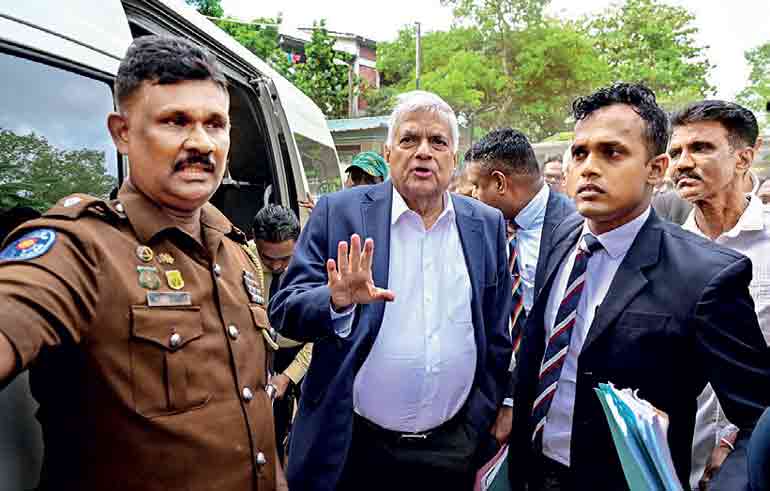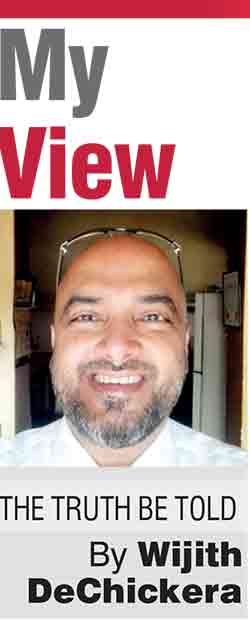Friday Feb 20, 2026
Friday Feb 20, 2026
Friday, 29 August 2025 04:01 - - {{hitsCtrl.values.hits}}

However one might frame the arrest or interpret the stand of the old guard, there is clearly something afoot in the affairs of state and within the machinery of politics
While the public debate still rages hotly, private reflections which don’t get liked or attacked on social media may be the order of the day a week and more after the arrest and remanding of a former executive president of Sri Lanka.
Not because the points of view expressed don’t have their relative merits or otherwise. But because a sense of proportion must eventually grasp the discourse by its horns and make the issue sit down and have a quiet think. And admittedly even this perspective is subjective if not slightly arbitrary.
Frame the case
The polity remains deeply divided over the most drastic political development to press its case recently.
On the one hand, the government has defended its actions as a single-minded pursuit of its agenda against alleged political corruption in high places. On the other, defenders of the ‘ancien regime’ have portrayed the Friday arrest and bail delays as being political expedience at best or personal revenge at worst.
 In-between these diametrically opposed positions, the citizens of the Republic of Social Media have arranged themselves in ranks spanning the spectrum from the sublime to the ridiculous.
In-between these diametrically opposed positions, the citizens of the Republic of Social Media have arranged themselves in ranks spanning the spectrum from the sublime to the ridiculous.
Legal eagles have shown cause as to how the investigation, detention and overnight remanding could or should have been handled differently if the government was to avoid the charges of vindictiveness or conducting a vendetta. Empathisers with the conservative establishment played the sympathy card, majoring on the senior status of a stalwart statesman who discharged sterling duty by helming the ship of state through its direst straits. Irate progressives welcomed the arrest and indictment as a move in the long-postponed direction of ending a culture of impunity especially for political elites.
And the man in the hot seat widened the dichotomy by contending that in the life of state officials such as him – especially at upper echelon executive levels – there is no division and separation of powers, perks, privileges and payment for services received in the discharge of public duties amidst personal detours or private affairs.
Old guard rallies
Not surprisingly in a milieu where the old, unitary political culture is still flourishing in the face of a new, republican regime – where the lines between democracy and republicanism are drawn more sharply than before – figures from the past presented a semblance of solidarity in speaking up for their erstwhile leader, opponent and often nemesis.
Even internationalists of the ilk of Erik Solheim and the calibre of Sashi Tharoor called for the expedient release of the incarcerated statesman and dismissed the charges against him as spurious and unworthy of being taken seriously.
After years of being in cohabitation, at loggerheads and on barely speaking terms, CBK, Sajith and Maithree respectively paid homage in their unique ways to that ideal of corporate empathy for fellow travellers in the presidential suite.
No time was lost by lesser mortals lower in the pecking order of the political who’s-who (hoo! hoo!), who had once supported or sparred with the former president, in articulating faux-sympathy in a bland attempt at hopeful self-preservation should the hammer fall on them as well in the not too distant future perhaps.
A new lens
However one might frame the arrest or interpret the stand of the old guard, there is clearly something afoot in the affairs of state and within the machinery of politics.
For one, the long arm of the law appears extended to collar – for a first time – the most unusual suspects. Howbeit the gavel of judgment may fall in this unprecedented instance, it is clear the writing is on the wall. Whether the court of public opinion condemns the incumbent administration for pressing state tools into the service of party political objectives or not, the shock waves sent out into the midst of a polity with mixed feelings and motives makes it clear that no one from here on will be above the reach of ostensible accountability.
For another, the suspected short-sightedness of a regime hell-bent on winning a battle but losing the war may become a bone of contention between loyalists of the regime and supporters of a rigorous republicanism.
Will the state drive towards arraigning all those who violated public trust and/or misused national funds receive the same short shrift as the putative saviour of the country in time not yet out of mind? Where should we look for proof of the probity of a prosecuting regime’s bona fides beyond bringing to book the financial misadventures of powerful political elites of the past?
To wit, if the duly diligent despatch of roles between the state and government and clear distinction between administrative impetus and judicial independence is not only maintained but seen to be so, the backlash from even a public supportive of ending an oppressive culture of impunity for an entrenched establishment may scupper more than the regime’s prospects at future elections – it may tarnish the image of the nation state at a critical juncture in the country’s ongoing attempts at economic reform and fiscal consolidation.
And although the closely watching international community would do well to rehearse historical precedents where not only are once favoured Lords High Poobah ejected from office à la Churchill once their services are rendered with no nod to gratitude but also where the Mikados are prosecuted for alleged corruption while in office like Chirac was for instance but acquitted while Sarkozy wasn’t.
A more rigorous republicanism
Be that as it may, the incumbents with a super-majority in parliament have set us as a state on a new path... and it won’t be the first instance in which majoritarianism of one type or the other has hijacked a mandate to serve a meaner purpose. As a person of some legal prominence perspicaciously observed, a Rubicon has been crossed – whether it was meant approvingly or alarmingly.
Right or wrong there is no going back... Or retracing the steps taken that led us here, re-traversing the route of the righteous indignation which hangs at present over our democracy’s head like a Damocles’ sword or reversing the process if (and especially if) the hammer should fall on those who wield it in a cause.
For now Caesar and his wife are not only not above suspicion, they are well below the bar of the state’s disapprobation. This may well be because once insurrectionist political movements have long memories and bitterly nursed grievances over alleged crimes half-forgotten by the forgiving public who value fuel passes above fundamental rights.
And a hostile regime not half ready to forgive and forget an arch enemy may resort to the Al Capone mode of retributive justice. If you can’t get them for alleged murder, protection rackets and other crimes, tax evasion will fit the bill.
The die is cast
With that being said there has to be some space for timely reflection beyond sheer realpolitik or mere political opportunism.
Will the state drive towards arraigning all those who violated public trust and/or misused national funds receive the same short shrift as the putative saviour of the country in time not yet out of mind? Where should we look for proof of the probity of a prosecuting regime’s bona fides beyond bringing to book the financial misadventures of powerful political elites of the past?
Why should not the bloodstained culpability of those spotlighted by damning reports tabled in parliament be coupled with belated accountability for those who caused bloodthirsty mayhem island-wide that led to a brutal state crackdown? How will the government handle inconvenient and embarrassing outstanding cases that finger the regime’s friends and past political allies?
How come there is no progress made in emblematic cases such as the deaths and disappearances of senior media personnel under authoritarian pro-military regimes? Why is there a deafening silence as to the identity of the alleged overlord mastermind of the Easter Sunday bombings?
If government cannot interpret its motives with the same hermeneutic of suspicion that it bestows on those who brought Mother Lanka off its bankrupt knees, the paradigm shift towards the more rigorous republicanism it so seemingly ardently desires will not only be stymied – it will be discredited in the public imagination and discarded by vested interests with an eye on political survival and revival of their currently dormant ambitions.
(Editor-at-large of LMD | Democratic-Republican)